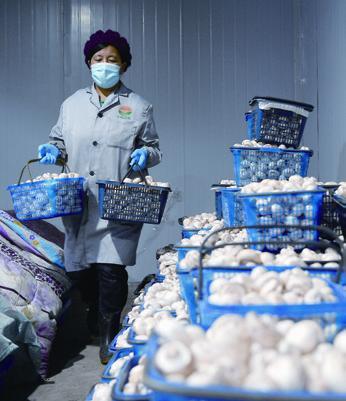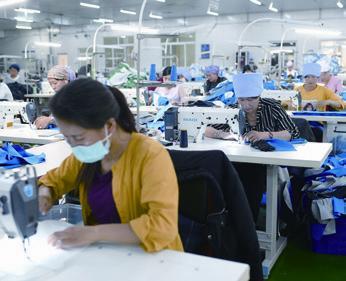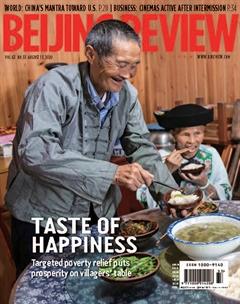PAIRED FOR PROSPERITY
By Lu Yan

Recently, Zhang Junning, 31, bought a car. This was unimaginable six years ago, when his family was still living in poverty.
At that time, he had just moved from Xihaigu, an impoverished mountainous region in Ningxia Hui Autonomous Region in northwest China, to Minning Town some 300 km away.
Away from the previous life of traditional farming, he was at a loss in his new surroundings in the beginning. All he could do was odd jobs like working on construction sites and he could barely make ends meet.
But the pressure was soon relieved as he and his wife were hired by a vineyard. After receiving training and self-learning, they gradually gained grape-growing skills and a stable and decent income.
Seeing more and more villagers like him being hired by the vineyard, Zhang came up with the idea of establishing a labor agency with the money he had earned and helping vineyards hire local villagers.
His entrepreneurship enabled him to not only shake off poverty, but also build a new house and live a comfortable life.
“If it werent for the national poverty alleviation program, I might still be a poor farmer who wouldnt be able to achieve this,” Zhang told China Central Television.
Fruits of collaboration
Since the mid-1990s, paired cooperation between Chinas more developed eastern regions and less developed western regions has been a major part of the strategy to alleviate poverty and bridge the previously widening wealth gap between these regions.At a conference on poverty alleviation cooperation held by the State Council in May 1996, 10 developed provinces in east China were paired with 10 underdeveloped regions in the west. Fujian, a coastal province in southeast China, was chosen to aid Ningxia.
In Ningxia, there are some areas like Xihaigu that were in poverty mainly due to extreme weather. “Droughts in summer, floods in autumn and freezing cold in winter” is how locals describe the region. In 1972, the United Nations classified Xihaigu as one of the worlds most uninhabitable places.
Under the Fujian-Ningxia partnership, a resettlement program was proposed to move entire village communities from impoverished areas like Xihaigu to more fertile land near the Yellow River. Minning is one of the resettlement locations.
As part of a poverty alleviation scheme, the development of Minning started in 1997 based on the idea of Xi Jinping, who was then deputy secretary of the Fujian Provincial Committee of the Communist Party of China and in charge of Fujians efforts to assist Ningxia.
The name Minning denotes the partnership between Fujian and Ningxia, as min refers to Fujian, while ning stands for Ningxia.
Now there are over 60,000 residents in Minning. The per-capita yearly disposable income of residents in Minning rose more than 20 times to a little under 14,000 yuan($2,013) last year, according to Zhao Chao, the towns deputy Party chief.
Zhao said the town will ensure that all 22 remaining poor households shake off poverty, as 2020 is the finish line to achieve the target of eliminating absolute poverty and building a moderately prosperous society in all respects.
The villagers who did not want to move to Minning were not left behind. The local government has supported the development of modern specialty industries such as fruit tree planting, which benefits both the economy and ecology. These industries offer an increasing number of jobs and other opportunities for villagers to earn a better living in Xihaigu.
People power
A number of government officials, teachers, medical workers, professors, experts, entrepreneurs and volunteers from Fujian have contributed to Ningxias poverty reduction.In 1998, experts on mushroom growing and technicians from Fujian came to Minning, which at that time was a fledgling village. They offered guidance to villagers on building hundreds of mushroom greenhouses from scratch.
Other commercial crops were planted following similar paths. With the development of a planting and breeding industry and an increasing number of migrants, more villages sprouted up in the area. In 2001, Minning Town was established. Now it has six administrative villages under it.
The wine industry is also a pillar industry in Minning, which has suitable natural conditions. At the end of the 1990s, just a few farmers planted grapes and made wine in family workshops, not on a large scale. Later on, facilitated by the Fujian-Ningxia partnership, the industry gained a bigger scale thanks to the push of businesspeople from Fujian.
Chen Deqi is one of them. He decided to set up vineyards in Minning after he visited the place in 2007. His investment has turned into nearly 5 million grape vines and over 3,000 hectares of an organic grape industrial park. His vineyard employs more than 3,000 villagers.
“This is just the beginning,” Chen said, adding that he plans to double the scale of his industrial park to provide more than 10,000 jobs for local residents.

